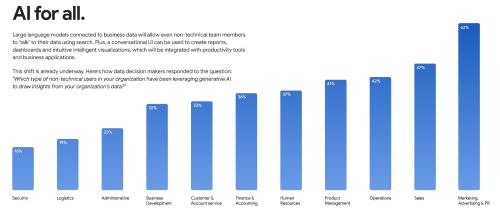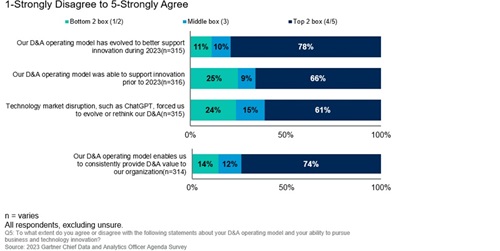Data Literacy, AI Democratization Top Trends in Data & AI/Analytics for 2024
Democratization of AI, the need for data literacy, and more are key themes in two new survey-based reports from a cloud giant and a research firm.
Google Cloud recently published "Data and AI Trends Report 2024, while Gartner announced its latest "Gartner Chief Data & Analytics Officer (CDAO) survey."
Generative AI, of course, was the star of each show, and one commonality between the two reports is the the democratization of the new tech, becoming more accessible to users of all types and even blurring the lines between job descriptions. In that regard, both reports find that "data literacy" is a key concern.
Google reported that nearly two-thirds of data decision-makers expect a democratization of access to insights in 2024, with 84% of survey respondents believing GenAI will help their organization access insights faster.
"It's almost impossible to overstate how significantly GenAI has changed the technological landscape," the Google report said. "In the case of business intelligence (BI), as tools become more accessible, even non-technical team members will be able to benefit from these insights; driving productivity and disseminating knowledge faster than ever before. That means better data literacy across your organization, smarter decisions being made, and ultimately greater success in the market."
Gartner, meanwhile, predicts bigger investments in data literacy.
"AI training is not just about quantity; it also requires a different approach. Recognize that the skill sets required for expert AI users will be very different from other users," said Ramke Ramakrishnan, VP analyst at the firm. "Gartner predicts, by 2027, more than half of CDAOs [chief data and analytics officers] will secure funding for data literacy and AI literacy programs, fueled by enterprise failure to realize expected value from generative AI."
In addition to investing in developing AI literacy among employees, Gartner also said organizations should use adaptive governance practices for more effective governance, along with implementing a trust-based approach to managing information assets in order to help users understand the provenance of information they use.
The democratization of advanced AI tech is a common theme throughout the industry as cloud giants and other major players continue to roll out ever more capable AI tools and services, once the exclusive province of data scientists and the like. Open source champion Linux Foundation, for example, recently unveiled the Open Platform for Enterprise AI (OPEA) as a new "Sandbox Project" from the Linux Foundation AI & Data Foundation. The goal is to facilitate and enable the development of flexible, scalable GenAI systems that harness the best open source innovations from across the ecosystem, (see "New Open Source AI & Data Platform Aims to Democratize GenAI Tech").
As democratization advances, Google sees a blurring of the roles of data and AI, reported by 80% of survey respondents. For one example, "Many data analysts are now taking on responsibilities that were traditionally reserved for data scientists and vice versa," the report said.
"Data analytics and engineering, AI, and business analytics are the most scarce skills within organizations," Google continued. "GenAI presents an opportunity to boost productivity of existing data teams and workloads, thus assisting with this widening skills gap. To be able to seamlessly use data and AI platforms allows organizations to improve productivity, and innovate faster by accelerating their data to AI journey."
An "AI for all" chart shows what type of non-technical users in organizations have been leveraging generative AI to draw insights from proprietary data.
 [Click on image for larger view.] AI for All (source: Google Cloud).
[Click on image for larger view.] AI for All (source: Google Cloud).
The blurring of data and AI roles was one of the top five trends in the Google report, which also listed:
- GenAI will speed the delivery of insights across organizations
- AI innovation will hinge on strong data governance
- Operational data will unlock GenAI potential for enterprise apps
- 2024 will be the year of rapid data platform modernization
Gartner, on the other hand, listed three more trends along with the above "empowered workforce" trend:
- Betting the Business: As AI continues to revolutionize industries on a strategic level, D&A leaders must demonstrate a bet-the-business skill set on AI and earn trust to lead the AI strategy within the enterprise.
- Managed Complexity: Many D&A systems are delicate, and their redundancies can cause chaos and added costs. "Leading organizations are working to turn this chaos into something they can manage - complexity. Complexity is, by definition, not an easy place to be, but acknowledging it gives a realistic understanding of the dynamic environment and helps the D&A teams in taking appropriate actions," said Ramakrishnan.
- Be Trusted: With the increasing accessibility and efficiency of GenAI, there is a challenge in navigating a world where data reliability is constantly questioned. Lack of trust within organizations, concerns about the value and quality of data, and regulations around AI are leading to a deluge of distrust.
Another news release published by Gartner explored how organizations are evolving their data and analytics operating models because of AI technologies.
"Responding to the rapid evolution of D&A and AI technologies, CDAOs are wasting no time in making changes to their operating model," said Alan D. Duncan, distinguished VP analyst at the firm. CDAOs are doing it to support data-driven innovation and accelerate organizational agility, with data governance at the core."
 [Click on image for larger view.] Evolution of D&A Operating Model to Pursue InnovationE (source: Gartner).
[Click on image for larger view.] Evolution of D&A Operating Model to Pursue InnovationE (source: Gartner).
"When asked about changes CDAOs need to make to their D&A operating model to be fit for current and future purpose, 38% of CDAOs said that their D&A architecture will be overhauled over the next 12-18 months," Gartner said. "Twenty-nine percent of respondents said they will revamp how they manage data assets and adopt and apply governance policies, practices and standards."
The annual Gartner Chief Data & Analytics Officer (CDAO) survey was conducted from September through November 2023 among 479 chief data and analytics officers, chief data officers (CDO) and chief analytics officers (CAO) across the world.
For the Google Cloud report, the company's Customer Intelligence team conducted a global research study on Data & AI Trends with 410 data decision-makers in December 2023 and January 2024.